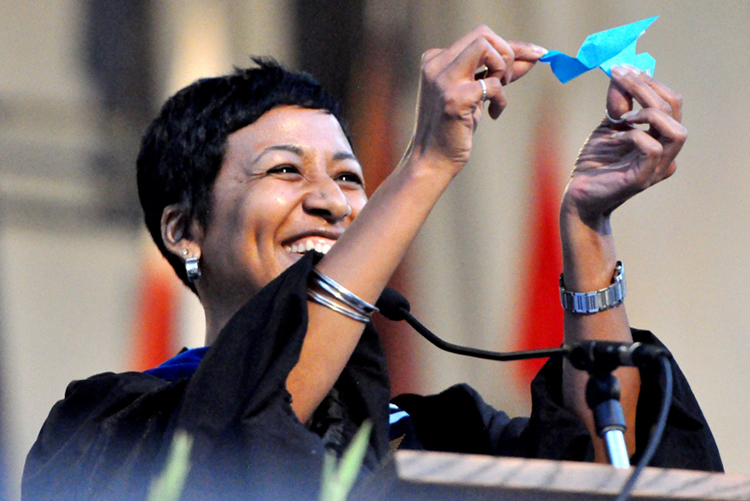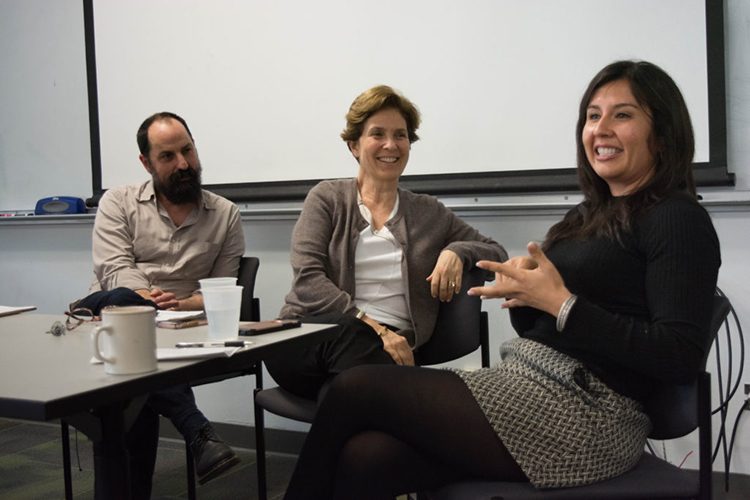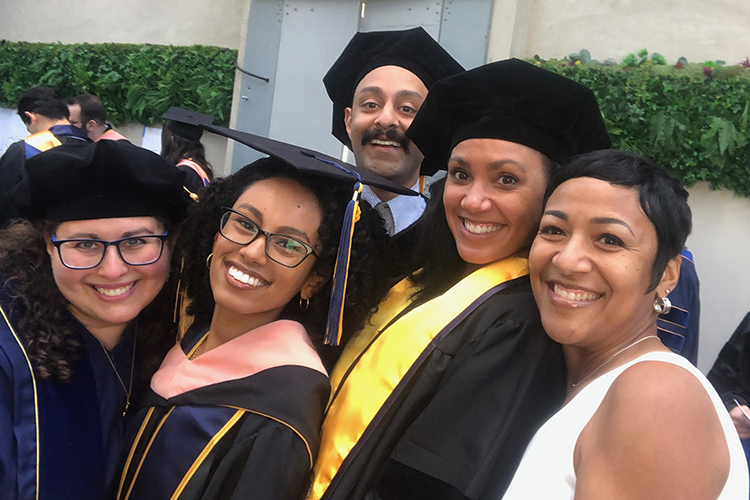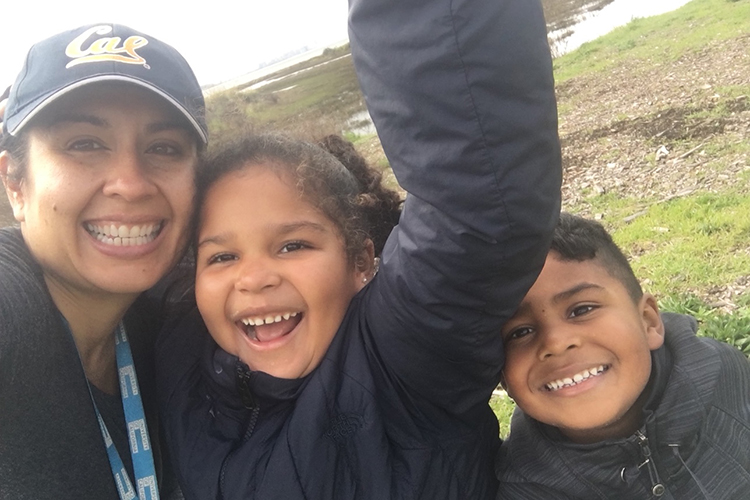How embracing your lived experiences can change the world
Berkeley faculty recipients of the 2022 Chancellor’s Award for Advancing Institutional Excellence and Equity discuss their impact on campus
March 1, 2022

UC Berkeley professors Amani Allen and Cristina Mora, who received the 2022 Chancellor’s Award for Advancing Institutional Excellence and Equity, discuss the impact of their research and service has on campus. In this 2016 photo, Allen speaks at a School of Public Health graduation encouraging students to spread their wings and fly. (Photo courtesy of Amani Allen)
What are the psychobiological mechanisms by which racism gets into the human body? Can we measure the impact racism has as a social determinant of health? How has the COVID-19 pandemic disproportionately impacted California’s minority communities? What impacts has immigration had on our understandings of diversity and democracy?
These are the types of questions UC Berkeley professors Amani Allen and Cristina Mora have explored over the years. For Allen, a Berkeley public health expert, that research has led to closer examination of racial and ethnic disparities in health status, including those brought on by disparities in the U.S. public health system. Similarly, Mora has become a leading voice for statewide COVID policy reform, and an advocate for the study of race and politics in the U.S.

UC Berkeley sociology professor Cristina Mora. (Photo courtesy of UCOP)
The two Berkeley faculty members — who also lead various campus initiatives that promote antiracist transformation — are recipients of the 2022 Chancellor’s Award for Advancing Institutional Excellence and Equity. The honor is presented to Berkeley faculty for outstanding contributions in advancing diversity, equity, inclusion, belonging and justice (DEIBJ) — through their research, teaching and public or university service.
But for Allen and Mora, their desire to serve is fueled by their lived experiences.
As a little girl growing up in Washington, D.C., Allen said she remembers playing during recess and a white classmate coming up to her and rubbing the back of her hand.
“I asked her, ‘What are you doing?’” Allen recalled. “And she said to me, ‘I’m trying to rub the dirt off your skin.’”

Photo of Allen, right, and her sister as kids. Allen said she experienced racist incidents at a young age that informed the way she viewed her place in the world. (Photo courtesy of Amani Allen)
Allen said those types of racist incidents happened often throughout her education, and made her feel excluded. Campus initiatives she leads now, like Berkeley Public Health’s Anti-Racist Community for Justice and Social Transformative Change program, allow her to help create an environment so that students, staff and faculty feel like they belong at Berkeley.
“I have always felt it to be an immense privilege to be in the position that I’m in as a Black woman to have influence, to help make decisions and to help create change so others can have a different experience than I did,” said Allen, who is also the executive associate dean at Berkeley Public Health. “It’s an incredible privilege and honor. It’s very humbling.”
A Berkeley alumna, Mora said her time as an undergraduate in the mid-1990s was greatly impacted by the passing of California’s Proposition 209, which banned affirmative action in higher education. She was part of a freshman class where the number of Latinx student enrollment had dropped significantly, making up only 2% of students that year.
In a state like California, “this was simply unacceptable.”
Having grown up in a Latinx neighborhood in Los Angeles, she said that the stark levels of underrepresentation and isolation of Berkeley’s Latinx students contributed to her feeling an unshakeable sense of imposter syndrome.
“At parties, in the dining halls, folks constantly asking, ‘What do you think of affirmative action?’ … Talk of race was everywhere,” Mora recalled. “Some people even said things to me like, ‘Aren’t you happy that you at least made it in?’ as though I should have felt some consolation amidst my loneliness.”

Mora said she felt a “loneliness” as a Berkeley undergrad because of the discourse around affirmative action and the lack of diversity on campus. (Photo courtesy of Cristina Mora)
Mora said those conversations impacted her academic trajectory — she took courses focused on the intersection of race, gender and poverty.
But she quickly realized there was a lack of curriculum based on the history and experiences of people of color, particularly of Latinx people. “Often professors would assign not a single reading on Latino communities, and this reinforced a feeling that I did not belong,” she said.
Through her research, Mora has since made it her life’s work to help shift that paradigm, writing and researching on Latinx and immigration politics and teaching courses on “Latinx Communities.” On campus, she is also currently helping to create a Berkeley Latinx faculty cluster that will bring more Latinx professors and Latinx-based courses to Berkeley.
“If you’re not talking about these communities, you’re invisiblizing them and the students that come from them,” said Mora, a sociology professor and director of Berkeley’s Institute of Governmental Studies.
Berkeley News recently spoke with Allen and Mora about how work based in DEIBJ can impact the greater public in positive ways, and why Berkeley is uniquely positioned to promote antiracist research.
Berkeley News: As a student, did you always want to pursue research based on racial disparities?
Amani Allen: No, initially, I was pre-med. I wanted to be a doctor working in direct care with individual patients.
To make myself more competitive for medical school, I pursued a master’s in public health at George Washington University. I also got an internship at the health department in Washington, D.C., where part of my job was to advise and collaborate on health policy formulation. Another aspect of my job was to work in the community, particularly in low-income and racial and ethnic minority communities to understand their experiences and train them on how to better navigate the with the local and broader public health system.
I remember walking into a community meeting, I had my suit on and carried a thick binder, and before I could even speak, a woman said to me, “You think you’re going to train us, but we’re going to train you.”
And I literally sat there for the next six hours and just listened to community members articulate so clearly not only that they knew exactly how to navigate the various systems of care, but also that those systems were not created for them. They were being excluded.

Allen’s experiences in community work influenced her trajectory as an academic and she has since conducted research and given presentations around the stark health disparities in America. (UC Berkeley photo)
I realized there was a disconnect between the health department and various policy makers and the communities they serve. That experience really shifted my career path; I wanted to understand the institutional issues that create health disparities in low-income communities of color. And that has led me to so much more nuanced research about the drivers of health disparities.
This is why I always tell my students that it’s great to have goals, but you have to be open to opportunities that may veer you off-course a bit. Who even knows where those goals came from? Maybe they are just what your parents want you to do. Finding your true calling requires you to follow your passions, and that’s not always a straight line.
How do students benefit from curriculum and work focused on DEIBJ?
Cristina Mora: When it comes to underrepresented communities, if you’re not talking about them, you are invisibilizing them.
If we don’t have a class on Latino politics, we can’t understand why Latinos have the lowest rates of coming out to vote. If we don’t have a class on Latino wealth and social mobility, it’s very hard for us to understand why Latinos are most likely to be in the “working poor.”
So, we need to offer these types of courses, and continue to delve into more nuanced research about underrepresented communities. As a campus that wants increase the Hispanic student population, to become a Hispanic-Serving Institution, it’s not enough to admit more students, but what are we doing to make these students feel like they truly belong on campus?
I direct a program in the sociology department called Berkeley Connect. And I do it inherently, because it’s an equity and inclusion project. It is a class where students meet with mentors and graduate students to talk about how to navigate Berkeley as an institution.

Mora answers questions from students at a Berkeley Connect event. “… if we can create spaces for these students to connect and have a discourse about looming grades or homework, or things that are happening at home, then that could help break those mechanisms of inequality,” she said. (UC Berkeley photo)
I think it’s a beautiful resource for underrepresented students because, fundamentally, one of the main mechanisms for inequality in society, and certainly at universities, is a lack of shared information. Some students know that it’s important to go to the career fair and try to network and get job referrals. Some students know that you need to start planning for your summers and internships really early. Some students know that you need to meet with your professor to ask for recommendations.
This is secret knowledge that is often not accessible to underrepresented and low-income students. How would you know this if your parents never went to college?
So, for these students, they come to campus, and it looks so different from their segregated neighborhood, and they’re just trying to stay afloat without that foundation of information that other students have.
But if we can create spaces for these students to connect and have a discourse about looming grades or homework, or things that are happening at home, then that could help break those mechanisms of inequality that we see in those communities.
For people who don’t believe doing research and work focused on these issues is important, how do you change their minds?
Allen: The incidents that we saw with George Floyd, Ahmaud Arbery, Breonna Taylor and many others received so much attention nationally, during the pandemic, when people were sitting at home with fewer distractions, leaving them more time to focus on the issue of racial injustice which was unfolding right before their eyes.
There is a greater national platform for these issues now — and I don’t see this going away anytime soon.

Allen said the Black Lives Matter movement has sparked interest in her research. “There is a greater national platform for these issues now,” she said. “and I don’t see this going away anytime soon.” (Photo by Maria Oswalt via Unsplash)
What that has done for scholars like me is that all of a sudden it made our work more interesting. There was never a lack of researchers like myself out there doing this work, but the work wasn’t as attractive.
Now, it’s not just academics doing the research. It’s the media bringing attention to these issues and also helping to get the science of social injustice out there to the public, giving scholars like me a platform, a voice in the national conversation. And its families and others having conversations around the dinner table. Everyone is talking about it, and everyone has their own opinion, but at least they are talking about it.
People are really starting to actively become more informed, and that gives me optimism about how our research can raise awareness and change minds. We just have to continue to do the work.
Mora: There are a lot of really great folks doing fantastic work that is fundamental to the study of racial equity. That is a huge part of what I do at Berkeley.
But I think people start to see the value in this research and work when there is tangible impact. Working with Berkeley’s Institute of Governmental Studies, I’ve been focused on getting scholarships and fellowships for underrepresented students to do public service and internships. And we’ve totally done that.
Students have spent their summers interning for immigrant rights organizations, members of Congress, their hometown school board, and things like that. Oftentimes, these opportunities are unpaid positions. But if you’re a student who works three jobs, you usually wouldn’t even apply to these internships.
But we’ve been fundraising for grants and telling others that Berkeley students are truly the future of American democracy. And they have this unique perspective gained from the diversity and excellence that UC Berkeley offers.
So, I think seeing immediate returns from this work can make people understand the value that it brings.
Why is Berkeley the ideal place to do this work?

Allen said she stays connected to her students in and outside of the classroom, providing mentorship and advice. “I always tell my students that it’s great to have goals, but you have to be open to opportunities that may veer you off course a bit,” she said. (Photo courtesy of Amani Allen)
Allen: I think that Berkeley creates successful platforms for their faculty to get their research out into the world. And it makes the work more influential.
Whether we’re interviewing with NPR or the New York Times, public relations staff are here to help us understand the art of media relations; how to distill our research down to three key messages and soundbites that can be easily digested and communicated for mass consumption.
Also, as a predominately white institution, it’s important to have diverse voices and perspectives as part of the university’s decision making. And Berkeley creates mechanisms for that.
For example, currently, I am a member of the African American Implementation Steering Committee and am also sitting on the search committee for the chief of police.
The world is watching Berkeley. What Berkeley does impacts what others do. And as a faculty member, I value and appreciate having spaces where I can be a part of transforming our campus.
Mora: The country is going through high levels of polarization, so it’s hard to think about how we can connect across the aisle and see each other in compassionate ways.

Mora with her children: Berkeley is the “test,” she said. “We are a place where we bring all those people together — with different races, classes, genders and backgrounds — from all walks of life, to foment those conversations.” (Photo courtesy of Cristina Mora)
And that’s why I think UC Berkeley is positioned to really push back against that division. We are that test. We are a place where we bring all those people together — with different races, classes, genders and backgrounds — from all walks of life, to foment those conversations.
Whether it is the single mom, the reentry student, the former construction worker, the underground scholar or the son of a professor, our students, staff and faculty have the ability to engage with one another. To have civil discourse and to compromise.
That is a real gift that Berkeley can give in its own unique way.